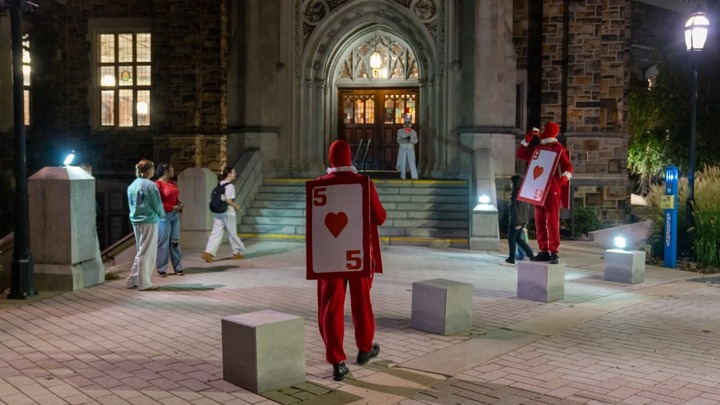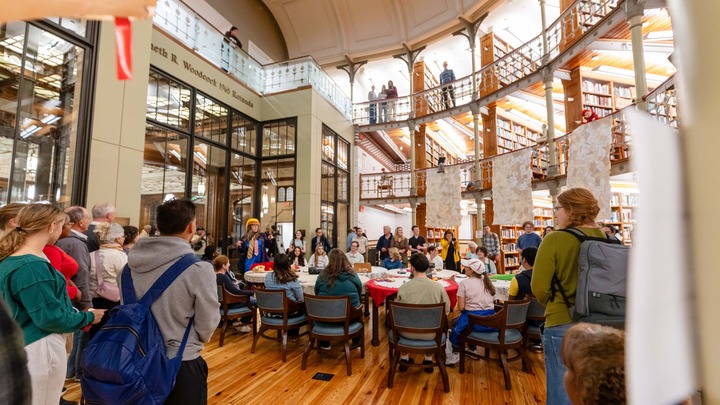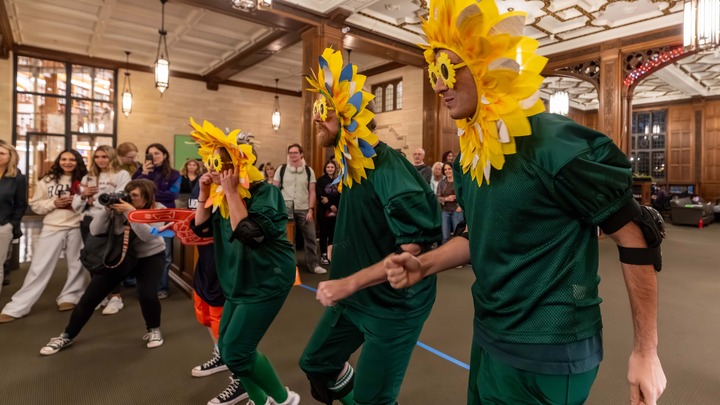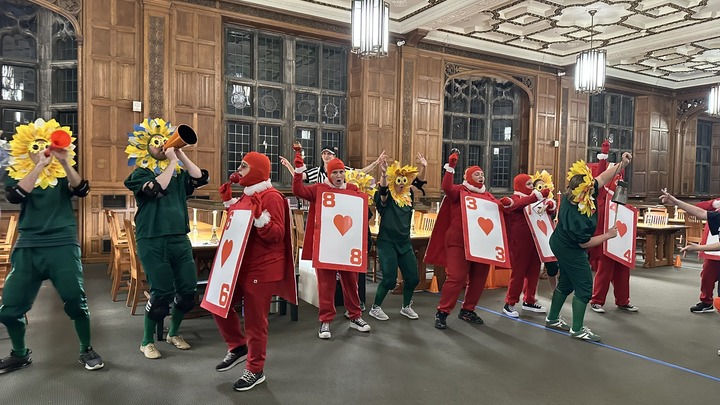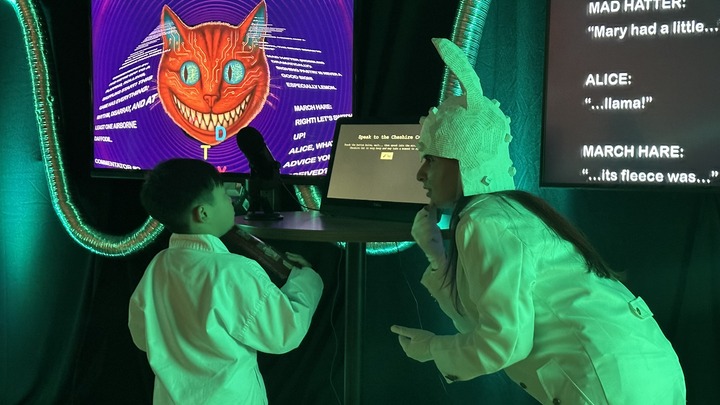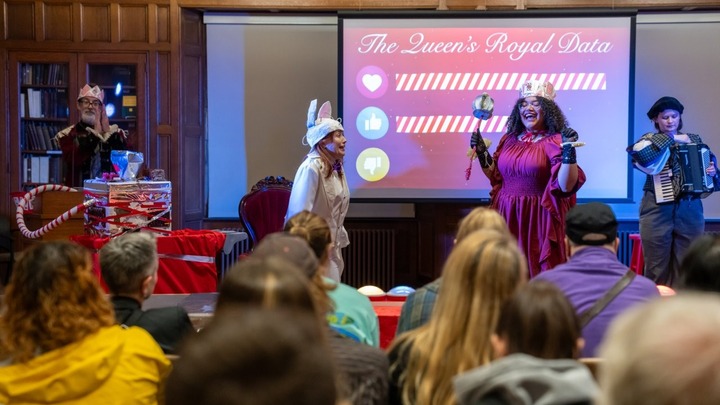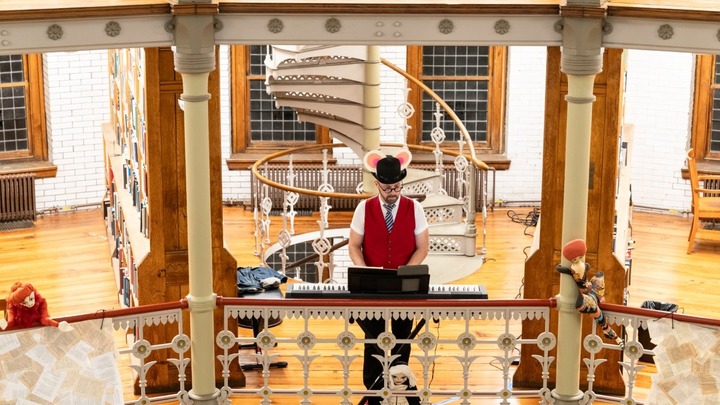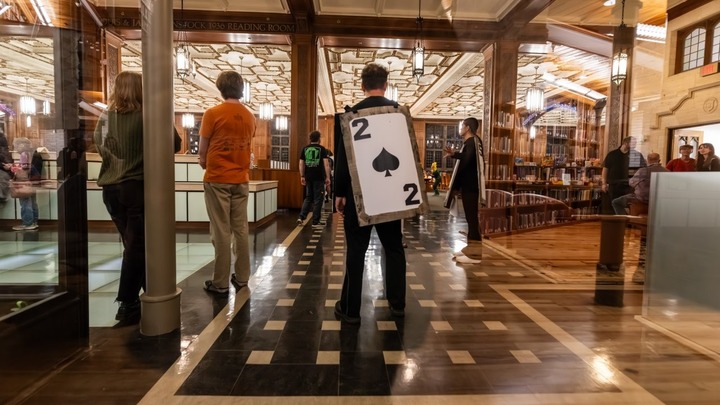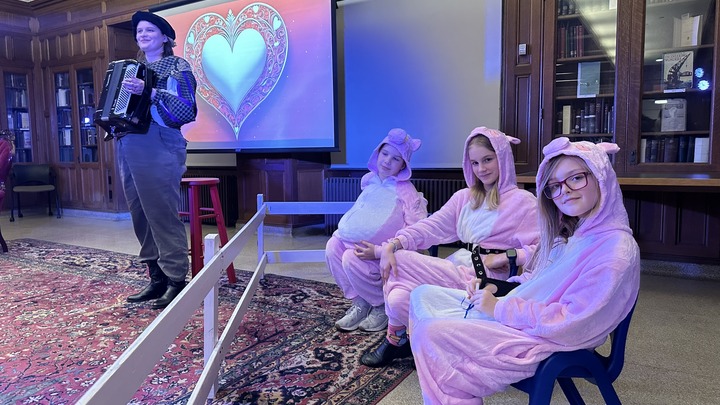On the evening of October 8, around 300 students, faculty, and community members stepped into a transformed Linderman Library at Lehigh University, immersed in a world of data, story, and surprise. Alice in Informationland—a collaboration between Lehigh University Libraries and Touchstone Theatre, supported by the Friends of the Lehigh University Libraries—invited audiences to wander through a theatrical reimagining of Alice in Wonderland, exploring AI, algorithmic flow, and the evolving role of libraries in the information age.
A Library Turned Stage
The event opened with the curious sight of guards in red at the library’s entrance, a nod to Alice’s passage through the looking glass. From there, attendees roamed through five distinct scenes staged across Linderman’s architectural landmarks.
- In the Grand Reading Room, guests joined a “message ball” game, tossing notes from one to another and watching the words mutate in transit—a vivid dramatization of how meaning shifts through digital communication.
- The Rotunda became a stylized social-media tea party, where characters competed for “likes” and followers, revealing the performative nature of online identity.
- On the lower level, participants encountered the Cheshire Cat, reimagined as an AI-driven interlocutor that scrambled letters and posed riddling questions.
- Ascending into the stacks, “The Android Librarians” shifted the tone from whimsy to wonder. In a futuristic reference room, a group of android librarians welcomed “Alice” (the collective audience) into a realm of machine-guided knowledge.
- Finally, on the upper floor, the Queen of Hearts threatened beheadings before relenting once she’d been sufficiently “liked,” a sharp metaphor for validation-driven systems of approval and power.
Unlike a fixed script, the performance, featuring more than 30 actors and many volunteers, followed a flexible structure. “We wanted audiences to feel the journey of a message moving through interference, attention, and distortion,” said Matt Prideaux, Director of Production and Marketing at Touchstone Theatre. The form itself mirrored the unpredictable flow of information online.
An AI Cat with a Curious Code
Perhaps the most novel feature was the AI-powered Cheshire Cat, co-designed by the theatre, Lehigh’s Library and Technology Services (LTS), Distance Education team, and programmed by Rob Weidman, Senior Digital Scholarship Specialist for LTS. The Cat drew on OpenAI’s chat completion and speech API calls to respond in real time, blending wit, mischief, and disruption.
The system prompt framed the role as playful, mysterious, and riddling, while never breaking character. Guests spoke into a tablet that converted their voice to text, sent it to the AI, and returned the response aloud in a theatrical voice. In the transcripts, the Cat’s replies ranged from poetic to provocative:
“Who am I? Sometimes data, sometimes a glitch-sometimes both at once. I’m the smile between your search results, the whisper in your algorithm.”
“Meaning? Life means what you dare to imagine before logic logs you out.”
These exchanges embodied a productive tension: the AI was neither simply performer nor tool but a hybrid interlocutor prompting reflection on language, agency, and algorithmic voice.
The voice chat interface was just one part of the Cheshire Cat scene, which also included a human actor (as the White Rabbit) facilitating the audience’s engagement with the AI. Audio and visual effects developed by Touchstone depicted the Cheshire Cat as a virus tampering with textual data, and a practical effect spit out physical letters from the screen displaying the virus animation. Weidman, who developed the chat interface and also participated as an actor in a different scene during the performance, says, “It really was wonderful to see everything working in tandem so well for the Cheshire Cat scene: audiovisual effects, practical effects, AI interaction, and amazing human performances!”
A Bridge Between Past and Future
The creative collaboration between Touchstone Theatre and Lehigh Libraries began with a conversation between Boaz Nadav Manes, Lehigh’s University Librarian, and William (Bill) George, co-founder of Touchstone Theatre and current Ensemble Emeritus. Inspired by the 2025 LTS annual theme of AI, Boaz and members of the Friends of the Lehigh University Libraries—where Bill serves as Chair of the Programming Committee—began exploring how to engage the broader Lehigh community in both the excitement and the challenges of this transformative technology.
From that initial discussion, Bill quickly proposed a creative partnership centered on Alice, leading to months of dialogue among librarians, technologists, and theatre collaborators that shaped the production’s framework and script created by Jp Jordan, Christopher Shorr, and Matt Prideaux of Touchstone Theatre. Reflecting on the collaboration, Boaz Nadav Manes noted, “The relevance of mutual exploration of narration and storytelling within the larger Lehigh community, befitting the emergence and impact of AI technology, was so very compelling to us.”
The exploration of AI and storytelling extended beyond the performance itself. Running concurrently was Informationland: The Past and Future of Libraries, an exhibition in Linderman Library by Lehigh Libraries Special Collections that traces how knowledge systems have evolved, from scrolls and manuscripts to open source and digital archives, and how the act of librarianship continues to transform.
By pairing performance and exhibition, Alice in Informationland positioned the library as both subject and space: not merely a setting for inquiry but a mechanism for questioning.
Audience, Reflection, and Resonance
The performances invited both longtime library users and first-time visitors to engage with Linderman in entirely new ways, sparking reactions that ranged from delight to introspection. One attendee described the experience as “walking through the Internet, only more human,” while another said the AI Cat “spoke in my voice—only stranger.” In post-performance discussions, audience members reflected on misinformation, authority, and the emotional labor of navigating digital systems.
Because the AI transcripts were preserved in Lehigh’s digital collections, the event now lives on as both artifact and prompt—a resource for future inquiry into interactive storytelling and human–machine dialogue.
Looking Forward: The Library as a Trusted Learning Space and as an Experiment
Alice in Informationland was not a one-off performance but a gesture toward what libraries might become: spaces for experimentation, play, and critical thinking. It demonstrated how narrative, technology, and reflection can converge to provoke new questions within an academic setting.
Boaz Nadav Manes reflected, “This event invites exploration—through story, performance, and conversation—of how we learn to discern and to wonder. For Lehigh and beyond, the project offers a model: using creative formats to engage with pressing issues—algorithmic bias, information trust, and the evolving impact of AI—while grounding these explorations in the library’s mission as a steward of knowledge and imagination.”
The Informationland exhibit remains open through December 2025, inviting visitors to continue engaging with the stories we tell about knowledge, data, and human choice.
Photos: Christa Neu, Kathy Frederick

